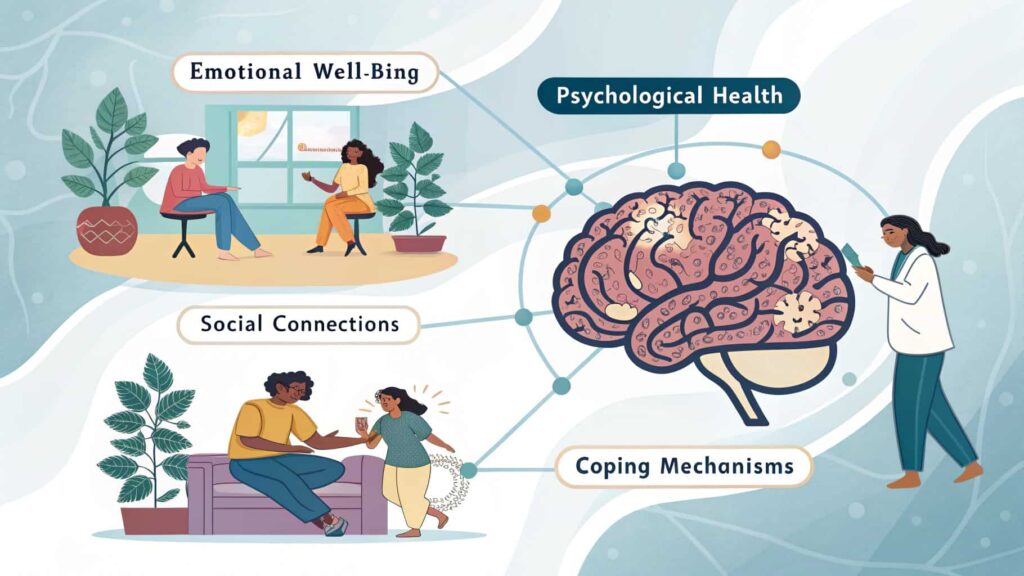Mental health is the foundation of our overall well-being, yet it often receives less attention than physical health. Whether you’re pursuing academic goals, building a career, or navigating personal challenges, your mental health profoundly impacts every aspect of your life. Understanding why mental health is important can empower you to prioritize self-care, strengthen relationships, and achieve your full potential.
In this article, we will explore the significance of mental health, its effects on daily life, physical health, education, and work, and strategies for improving it. We will also highlight warning signs, risk factors, and treatment options to help you take informed steps toward better mental well-being.
What Is Mental Health?
Mental health is not just the absence of mental illness. According to the Substance Abuse and Mental Health Services Administration (SAMHSA), it is a person’s emotional, psychological, and social well-being. Mental health determines how we cope with stress, relate to others, make decisions, and navigate life’s challenges.

It is important to note that mental health is dynamic—it can fluctuate over time depending on our circumstances, stress levels, and coping mechanisms. Maintaining positive mental health allows individuals to live meaningful, productive lives, even in the face of challenges.
How Mental Health Affects Daily Life?
Good mental health is foundational for everyday functioning. When we are mentally healthy:
- We can handle daily tasks and responsibilities with clarity and focus.
- We maintain healthier relationships and communicate effectively.
- We make sound decisions, solve problems efficiently, and adapt to change.
- We experience a greater sense of purpose, satisfaction, and resilience.
Conversely, poor mental health can negatively impact every aspect of life. Chronic stress, anxiety, or depression may lead to decreased productivity, strained relationships, and challenges in achieving personal or professional goals. Mental health is not just a personal matter—it is essential for thriving in a connected and complex world.
Why Is Mental Health Important for Students?
Students face unique pressures, from academic demands to social challenges and career uncertainty. The World Health Organization (WHO) reports a growing prevalence of mental health challenges among students, exacerbated by global crises such as the COVID-19 pandemic.
Studies show that:
- Around 20% of students report experiencing depression affecting their studies.
- Approximately 28% experience anxiety that hinders academic performance.
Ignoring mental health in this context can result in academic burnout, social isolation, and long-term effects on career and personal development. For students, prioritizing mental health is not optional—it is critical for academic success and life-long well-being.
How Mental Health Influences Physical Health?
The connection between mental and physical health is profound. Chronic stress, anxiety, and depression can manifest physically, resulting in headaches, digestive issues, sleep disturbances, and weakened immunity.
Conversely, chronic physical illnesses can exacerbate mental health challenges. For example:
- Diabetes, cardiovascular diseases, and obesity are often associated with higher rates of depression.
- Individuals with chronic pain are more prone to anxiety disorders.
This mind-body interplay highlights the importance of treating mental health as an integral part of overall health. Holistic approaches that combine physical wellness, stress management, and emotional support can significantly improve outcomes.
Common Mental Health Problems And Their Impact – What You Need to Know!
Mental health challenges can affect anyone, regardless of age, gender, or background. Recognizing and understanding these issues is essential for early intervention and long-term well-being. By identifying common mental health problems, we can better appreciate why prioritizing mental wellness is so important. Some common issues include:

Anxiety Disorders:
Anxiety disorders affect nearly one in three people during their lifetime. Symptoms include:
- Persistent worry or fear
- Panic attacks
- Physical symptoms such as increased heart rate, sweating, or fatigue
Anxiety can interfere with daily activities, making even simple tasks feel overwhelming. Left unmanaged, it can lead to social isolation, decreased productivity, and strained relationships.
Depression:
Depression is a leading cause of disability worldwide. Symptoms may include:
- Persistent sadness or emptiness
- Irritability and guilt
- Changes in sleep, appetite, and energy
- Suicidal thoughts in severe cases
Depression can make it difficult to enjoy previously pleasurable activities, affecting work, school, and personal life. Early treatment, including therapy and lifestyle changes, can significantly improve quality of life.
Trauma and Post-Traumatic Stress Disorder (PTSD):
Traumatic experiences can result in PTSD, characterized by:
- Flashbacks and intrusive memories
- Nightmares and panic attacks
- Emotional numbness or hypervigilance
PTSD can disrupt relationships, work, and daily routines, often causing individuals to relive trauma repeatedly. With proper therapy and support, people can regain control over their lives and reduce symptoms.
Addiction:
Substance abuse and addiction are complex mental health disorders, often requiring professional intervention. Drug overdose and alcohol-related deaths continue to rise globally, highlighting the urgency of addressing these issues. Addiction often co-occurs with other mental health disorders, creating a cycle of dependence and emotional distress. Recovery typically involves professional treatment, counseling, and strong support systems.
Psychotic Disorders:
Conditions such as schizophrenia and schizoaffective disorder involve:
- Hallucinations or delusions
- Disorganized thinking
- Difficulty distinguishing reality
These disorders can significantly impact a person’s ability to live independently or maintain employment. Early diagnosis and consistent treatment, including medication and therapy, improve long-term outcomes.
Other Disorders:
- Eating disorders: Anorexia, bulimia
- Mood disorders: Bipolar disorder
- Obsessive-Compulsive Disorder (OCD)
- Personality disorders: Borderline personality disorder
These disorders often affect social interactions and self-esteem, making daily functioning challenging. Understanding symptoms and seeking timely support is crucial for managing these conditions effectively.
What Are The Warning Signs And Risk Factors Of Mental Health Issues?
Mental health challenges can arise from a complex interplay of genetics, life experiences, and environmental factors. Being able to recognize early warning signs and understand risk factors is essential for timely intervention and maintaining overall well-being.
Common Warning Signs of Mental Health Problems:
- Changes in appetite or sleep patterns: Significant increases or decreases may indicate underlying emotional distress.
- Withdrawal from social interactions: Avoiding friends, family, or previously enjoyed activities can signal mental health struggles.
- Persistent sadness or irritability: Ongoing negative emotions that interfere with daily functioning are important to address.
- Engaging in risky or compulsive behaviors: Self-harm, reckless decisions, or compulsive habits may reflect mental strain.
- Substance misuse or addiction: Turning to drugs or alcohol to cope can both result from and exacerbate mental health issues.
- Suicidal thoughts or behaviors: Thoughts of self-harm or suicide are serious warning signs requiring immediate professional attention.
Key Risk Factors:
Some individuals may be more vulnerable to mental health challenges due to:
- Trauma or abuse: Past or ongoing experiences of physical, emotional, or sexual abuse can increase risk.
- Sudden loss or major life changes: The death of a loved one, job loss, or divorce may trigger mental health difficulties.
- Chronic stress: Persistent stress at work, school, or home can gradually affect emotional well-being.
- Adverse childhood experiences: Early-life hardships can have long-term effects on mental health.
Recognizing these warning signs and risk factors early can help prevent more severe complications. If you notice these signs in yourself or someone else, reaching out to a mental health professional promptly can provide guidance, support, and access to effective treatment.
What Are The Best Strategies for Maintaining Mental Health?
Maintaining mental health is an ongoing process that requires intentional habits, self-awareness, and support. By adopting practical strategies, you can strengthen resilience, manage stress, and enhance overall well-being.

Prioritize Self-Care:
Self-care is the foundation of good mental health. Focus on:
- Adequate sleep: Aim for 7–9 hours per night to allow your brain and body to recharge.
- Balanced nutrition: Eating a nutrient-rich diet supports both mental and physical health.
- Physical activity: Regular exercise reduces stress, boosts mood, and improves cognitive function.
- Relaxation techniques: Meditation, deep breathing, yoga, and mindfulness can calm the mind and reduce anxiety.
Cultivate Healthy Relationships:
Supportive social connections can buffer against stress and promote emotional well-being.
- Spend time with friends and family who uplift you.
- Set boundaries in relationships to maintain your mental balance.
- Seek communities or support groups that share your interests or challenges.
Manage Stress Effectively:
Stress is unavoidable, but managing it is key to mental wellness. Strategies include:
- Breaking large tasks into smaller, manageable steps
- Practicing time management and organization
- Engaging in hobbies and activities that bring joy and relaxation
Seek Professional Help:
There is no shame in reaching out for mental health support. Professional help can provide guidance tailored to your needs:
- Therapy or counseling: Provides a safe space to explore emotions and develop coping strategies.
- Medication management: For some, medications can help regulate mood or alleviate symptoms.
- Combination care: Many people benefit from both therapy and medical treatment.
Adopt a Holistic Approach:
Mental health is closely tied to physical and emotional health. Consider:
- Journaling or reflective writing to process thoughts and emotions
- Creative outlets like art, music, or dance
- Mind-body therapies such as tai chi, massage, or acupuncture
Practice Early Intervention:
Addressing symptoms early can prevent issues from escalating. Monitor your emotional and mental state regularly and don’t hesitate to seek support if warning signs arise.
Build Resilience:
Develop skills to adapt and thrive in the face of challenges:
- Learn to accept change and uncertainty
- Practice self-compassion and reduce unrealistic expectations
- Celebrate small achievements and progress
By integrating these strategies into daily life, you can maintain strong mental health, improve resilience, and enhance overall quality of life.
Why Is Mental Health Important for Society?
Mental health isn’t just about the individual—it affects everyone around us. When communities, schools, and workplaces prioritize mental well-being, people are happier, more productive, and better able to connect with others. Supportive environments can reduce absenteeism, lower rates of substance abuse, and improve overall relationships.
Encouraging open conversations about mental health also helps break down stigma, making it easier for people to seek help when needed. Communities that invest in mental health education, resources, and supportive policies foster creativity, innovation, and a stronger sense of belonging. In short, caring for mental health benefits not only individuals but society as a whole.
What Digital Resources and Support Systems Are Available for Mental Health?
In today’s digital world, mental health support is more accessible than ever. Online tools make it easier to get help, track progress, and connect with others. Some key options include:
- Online therapy platforms: Access licensed counselors and medication management from home.
- Support groups and forums: Share experiences, find encouragement, and learn coping strategies from others facing similar challenges.
- Digital mental health apps: Manage stress, track habits, practice mindfulness, and monitor emotional well-being.
Schools, universities, and workplaces are also offering digital programs to support mental health, especially in high-stress environments. Students and employees can now access resources without stigma, making care more convenient and proactive.
How Are Innovative Approaches Transforming Mental Health Care?
Technology and research are changing the way mental health is treated, making interventions more personalized and effective:
- Teletherapy and AI-driven apps: Offer customized guidance, exercises, and progress tracking for different mental health needs.
- Virtual reality therapy: Helps treat phobias, PTSD, anxiety, and stress by creating safe, controlled environments for exposure therapy.
- Preventive mental health screenings: Detect early signs of mental health challenges, allowing timely intervention before problems escalate.
Innovation in mental health care goes beyond treatment—it includes education, self-monitoring, and building environments that support emotional well-being.
Why Addressing Mental Health Early Matters?
Mental health challenges can arise gradually or suddenly, and sometimes it’s easy to overlook the early signs. Recognizing and addressing issues early can prevent them from escalating and help maintain overall well-being. Paying attention to your mental health is not just about avoiding crises—it’s about supporting a healthier, more balanced life.

Ignoring mental health issues can result in:
- Worsening mental and physical health conditions
- Disrupted personal and professional life
- Increased risk of addiction or self-harm
- Reduced life satisfaction and well-being
Mental health challenges, if left untreated, can also strain relationships and limit opportunities for personal growth. Conversely, early intervention improves resilience, coping strategies, and long-term outcomes. Mental health care is as essential as any medical care—it empowers individuals to live fuller, healthier lives and maintain a better balance in all aspects of life.
FAQs:
How does stress affect mental health?
Chronic stress can disrupt mood, memory, and decision-making. Over time, it may lead to anxiety, depression, or other mental health challenges. Learning stress management techniques is key to maintaining emotional well-being.
What lifestyle habits improve mental health?
Regular exercise, balanced nutrition, adequate sleep, and relaxation techniques strengthen mental well-being. Building supportive relationships and engaging in hobbies also play a crucial role. Consistent self-care habits reduce stress and improve emotional resilience.
How is addiction related to mental health?
Addiction often co-occurs with mental health conditions like depression or anxiety. Substance use may start as a coping mechanism but can worsen emotional struggles. Professional treatment and support systems are essential for recovery.
Can mental health affect creativity and problem-solving?
Absolutely. Good mental health enhances focus, cognitive flexibility, and innovative thinking. Conversely, untreated mental health challenges can reduce productivity and limit creative potential. Maintaining mental wellness nurtures both personal and professional growth.
How does mental health impact relationships?
Mental health shapes how we communicate, empathize, and resolve conflicts. Poor mental health may lead to misunderstandings or emotional withdrawal. Prioritizing emotional well-being fosters stronger, healthier, and more supportive relationships.
Why is reducing stigma around mental health important?
Stigma prevents many people from seeking help, leading to untreated conditions. Open conversations normalize mental health care and create safe spaces for support. Reducing stigma encourages early intervention and overall societal well-being.
Conclusion:
Mental health is a vital part of our overall well-being, affecting how we think, feel, and live daily life. Prioritizing mental wellness helps us manage stress, build strong relationships, and achieve personal and professional goals. Early intervention and support can prevent serious complications and improve long-term outcomes. Communities, workplaces, and schools all benefit when mental health is valued and supported.
Using resources, adopting healthy habits, and seeking help when needed empowers individuals to lead fuller, happier lives. Ultimately, taking care of your mental health is one of the most important steps you can take for a balanced and fulfilling life.
Also Read:


Leave a Reply